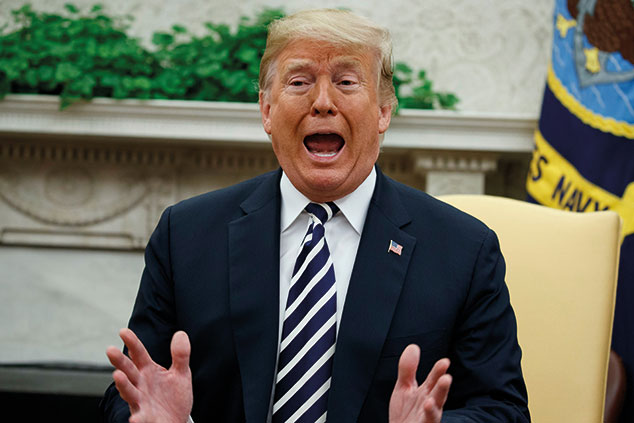
On Monday, Donald Trump ratcheted up the escalating trade war with China by announcing 10% tariffs on $200bn worth of Chinese goods, to take effect from 24 September. The rate will be raised to 25% on 1 January. China responded the next day by imposing tariffs on $60bn in American goods. China appears more vulnerable in a tariff war, because it imports around $130bn of goods from America each year, while its exports to the US total $500bn.
Trump may now fulfil his threat to tax another $267bn worth of products – “basically everything America buys from China”, say Jim Tankersley and Alan Rappeport in The New York Times. Following China’s announcement, Trump tweeted that China was trying to influence the outcome of the November midterm elections by “attacking our farmers, ranchers and industrial workers because of their loyalty to me”.
Inflaming the situation
Earlier on Tuesday Wilbur Ross, the commerce secretary, claimed that the new tariffs were an attempt to force Beijing into more productive trade talks, says Tom Rees in The Daily Telegraph. Whether this tactic will work is unclear. One senior Chinese official told The Wall Street Journal that Beijing would not negotiate “with a gun pointed to its head” and Beijing is reportedly reconsidering an invitation issued just last week for senior Chinese officials to meet with Steven Mnuchin, the Treasury secretary.
However, Li Keqiang, China’s premier and the country’s second most powerful official, told the World Economic Forum on Wednesday that China would not engage in currency devaluation to boost exports and would “accelerate its plan to open up to the outside world and uphold international trade rules”, says Frank Tang in The South China Morning Post.
Yet Li’s efforts to “de-escalate the conflict” were met with “inflammatory language” from two Republican politicians present, says Jeremy Warner in The Daily Telegraph. “In the US we say talk is cheap and actions are what matter,” said Todd Rokita, a member of the House of Representatives. Asked how far the US was prepared to go in its trade war, he added “we will keep going until we win”.
China needs new weapons
Assuming China does not back down, it will soon run out of American goods on which it can impose duties and must look for “other ways of fighting back”, says Gideon Rachman in The Financial Times. “Some changes are already visible.” Diplomats say China has already eased sanctions on North Korea, which are key to US efforts to get the regime to denuclearise. China could manipulate its currency and make it harder for American businesses to operate in China.
It could also refuse to buy Treasury bills, “making it hard to run the US federal deficit”. The consensus was that China would “never dump American debt because that would drive down the value of China’s own savings”. But with the US deficit soaring, the Chinese will “certainly be exploring the possible use of the debt threat”.
Yet the risks from bad relations between the world’s two largest economies may be far greater than this. In recent weeks, “China has begun to suspect that the trade war is about more than just economics”, says Will Saetren in The South China Morning Post. Some Chinese officials and academics see the trade war as part of “a grand strategy reminiscent of the cold war policy of containment” of the Soviet Union. They believe that the intention is to thwart the rise of China. “This is a dangerous development that has profound implications for strategic stability.”